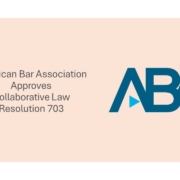Last year, Florida Governor Rick Scott signed into law the Collaborative Law Process Act. There are still some steps that need to be taken for the law to go into effect (namely, the Florida Supreme Court will need to establish rules of procedure and rules of professional conduct). However, the collaborative community celebrated this milestone after a seven year effort by family law attorneys, mental health professionals, and financial professionals.
Uniform Collaborative Law Act
Florida’s Collaborative Law Process Act is based on the Uniform Collaborative Law Act (“UCLA”). The UCLA is proposed legislation drafted by the National Conference of Commissioners on Uniform State Laws. The Uniform Law Commission, as it is more commonly known, creates proposed legislation that it hopes states will adopt to bring consistency and clarity to different areas of the law.
Back in 2010, the American Bar Association House of Delegates was considering whether to support the UCLA. In the video below made in 2009, Harvard Law Professor David A. Hoffman explains the UCLA. He also advocates for the American Bar Association to support the UCLA.
Read more →




